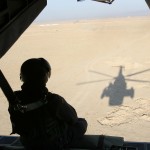Will Wikileaks Force Europe Out of the War?
 Sunday’s WikiLeaks Afghan war revelations will only amplify the already strong public opposition to keeping British and German forces in Afghanistan.
Sunday’s WikiLeaks Afghan war revelations will only amplify the already strong public opposition to keeping British and German forces in Afghanistan.
The documents WikiLeaks leaked to the New York Times, The Guardian, and Der Speigel don’t provide any really new information. Everyone who follows the war closely knows that Pakistan, particularly ISI, rarely behaves as the United States wishes it would. ISI's corruptibility has long been a concern for U.S. diplomats and national security officials, and it appears not much has changed in that regard. Likewise, Hamid Karzai and company are tied to all sorts of corrupt, unsavory activities. Nothing surprising here, either. What is damning, however, is the timing.
Angela Merkel, David Cameron, and to a lesser degree, Barack Obama have been trying to calm the public’s increasing impatience with the conduct of the war in Afghanistan. For Cameron and Merkel, the presentation of the findings in The Guardian and Der Speigel may leave them no choice but to heed public pressure and begin withdrawing troops from Afghanistan. What the consequences of such a decision would be for NATO is another question entirely.
Cameron and Merkel have been lukewarm to say the least towards the prospect of staying in Afghanistan beyond this year. Sunday’s leaks will only amplify the already strong public opposition to keeping British and German forces in Afghanistan.em> <
em>The Guardian's <website features a massive black logo featuring the ominously placed phrase “Afghanistan: The War Logs” as the standout text. “The War Logs” is in blood red on a black background. The story adds the headline “Massive leak exposes truth of occupation” (Emphasis added). Immediately below the headline are three bullet points. First: “Hundreds of civilians killed by coalition troops.” Below it: “Covert unit hunts leaders for 'kill or capture.'” And finally: “Steep rise in Taliban bomb attacks on NATO.”
The Guardian presents an equally pessimistic rendering of the facts revealed by the leaked documents. Appearing in the middle of the Guardian's article are more bullets.
• How a secret "black" unit of special forces hunts down Taliban leaders for "kill or capture" without trial.
• How the US covered up evidence that the Taliban have acquired deadly surface-to-air missiles.
• How the coalition is increasingly using deadly Reaper drones to hunt and kill Taliban targets by remote control from a base in Nevada.
• How the Taliban have caused growing carnage with a massive escalation of their roadside bombing campaign, which has killed more than 2,000 civilians to date.
The Guardian's op-ed page concludes its analysis of the so called revelations with the following: “However you cut it, this is not an Afghanistan that either the US or Britain is about to hand over gift-wrapped with pink ribbons to a sovereign national government in Kabul. Quite the contrary. After nine years of warfare, the chaos threatens to overwhelm. A war fought ostensibly for the hearts and minds of Afghans cannot be won like this.”
The coverage from Der Speigel's online international version is a little, but not much, kinder in its presentation of the leaks. It's lead story is headlined: “The Helpless Germans: Afghan War Logs Illustrate Lack of Progress in Bundeswehr Deployment” The first graph, in bold, reads
The war logs obtained by WikiLeaks depict a situation in northern Afghanistan that is far worse than it is depicted in the reports German Chancellor Angela Merkel gives to parliament. They also show even though the German armed forces, the Bundeswehr, have been present since 2002, they have made little progress in Afghanistan.
These papers may or may not be overstating the importance of the information revealed by the leaked documents. They do however reflect the fears held by many within the press and amongst the public in both countries. Warranted or not, the public fallout from these stories could very well result in enough political pressure to force Cameron and Merkel to rethink their Afghan policies. What impact such decisions would have on NATO or each country’s relationship the United States remains to be seen.